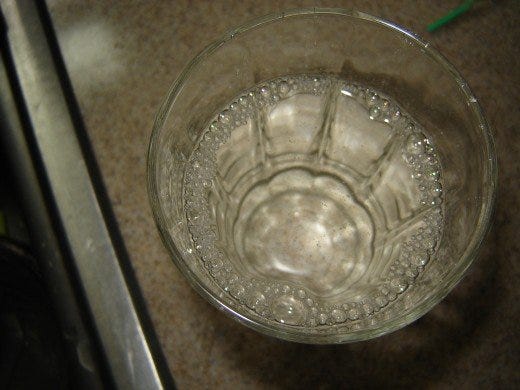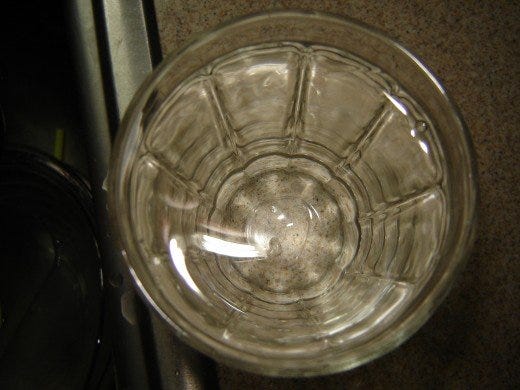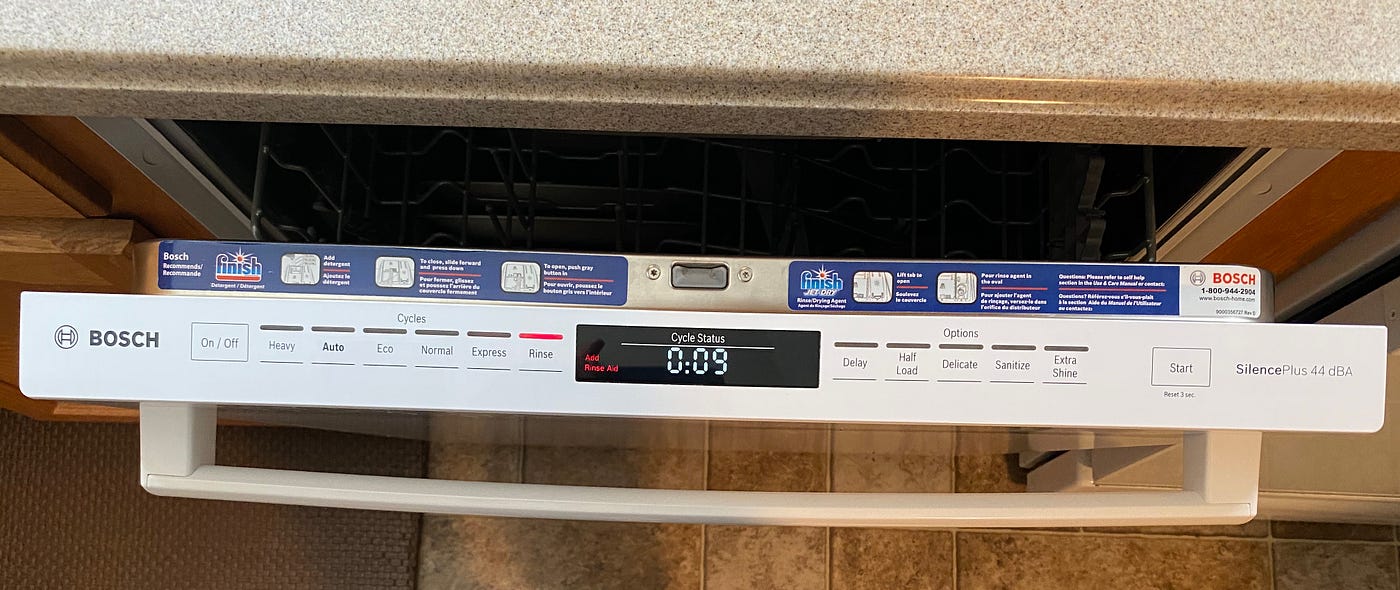Soap Bubbles In Our Drinking Glasses
Soap Bubbles In Our Drinking Glasses
Water Conservation can defeat its own purpose
We had moved to a new home in 2005 which came with truly awful GE appliances, surely picked out by the builder as being the absolute cheapest he could find. We would have selected something better, but this house was contracted by someone else and then their mortgage had fallen through. The location was what we wanted. The appliances were junk and a small list of other things was not ideal, but there are three things that are really important in real estate. You know them already: location, location, and location.
So we bought the house, lousy appliances included.
The dishwasher cleaned the dishes well enough, but it was noisy. Very noisy. The furnace was noisy, too, but we could shut the doors on that. The only way we could avoid the dishwasher was to only run it just before bed. Even then, at the other end of the house and behind a closed door, we could hear it.
We put up with that for five years. We then picked out a Bosch, not the most expensive model, but not the cheapest. We offered the GE to a cash strapped nephew whose wife was washing dishes for their four person family by hand. He came to get it with an ear to ear grin. “It’s noisy”, I warned.
“Who the eff cares!” he exclaimed. He helped me install the Bosch, I helped him load the GE in his truck. “Happy wife, happy life!” were his final words as he drove off.
A Happy Day
When we first ran the new Bosch, we were ecstatic.
“You can’t even hear it!”, my wife chirped.
Well, you could, but compared to the one we’d lived with for five years, it was peaceful and blissful near silence. We were happy.
Until..
Until it was time for dinner. I filled our usual glasses, two for each of us. One for milk, one for water. Milk is always a little frothy, but water shouldn’t be, especially after running through the under sink filtration system I had installed when we first moved in.

I dumped out the water. Must be something wrong with the filtration, I thought. I let it run a few minutes, then refilled the glass. There was less foam, but it still had some. I pulled another glass from the cabinet and filled that. Lots of foam again.
I ran tap water into the glasses and tried the filtered water again. Success! No bubbles!

The cement mixer GE washer hadn’t left much soap in our glasses. It had left a little, so we were used to a quick rinse of our glasses, but we expected the Bosch to be much better. It was much, much worse.
Surely this must be a defective product. I called for service and was told that there could be any number of reasons for this, leading with that I had installed the machine incorrectly. The woman on the phone then listed other reasons.
Things that can cause left over soap
Blocked drains
If the soapy water can’t drain, all the rinsing in the world after that cycle is not going to help. The woman strongly suggested that I had kinked the drain hose when installing the dishwasher.
Well, the Bosch drain hose is very well designed. It mostly ran along the side of the outside wall and what little I had to deal with would have been hard to mess up. Still, I pulled machine out to check that. No bends, no kinks. I also interrupted the cycle to confirm that the water had exited when it should have.
Water is not hot enough
That really shouldn’t matter because the dishwasher has coils to heat up the water. I argued with that woman a bit, but in fact our water was a few degrees hotter than what she said it had to be.
Dishwater Soap
If any dish or hand detergent gets on to dishes waiting in the sink, you can create extra suds. She told me that dish and hand soap is designed to suds up, but dishwasher soap is not. We made damn sure that didn’t happen by religiously pre-rinsing every damn thing before it went into the dishwasher.
The glasses still came out with suds.
Built up soap residue
This is the past sins theory. Perhaps we had built up a residue that was coating the walls. Her suggested solution was to run through a few cycles without soap and a cup of white vinegar. This would strip away old soap, she explained.
I used a full gallon and a half of white vinegar in a dozen or more cycles with no soap. I left some previously washed glasses in there as controls. They came out and did not bubble when filled with water. But when we ran a normal wash again with its tiny ration of dishwasher powder, those glasses were sudsing.
Your water is too soft, use less soap, less Jet Dry
We cut the soap down to less than a half teaspoon — still had bubbles. We tried it with less Jet Dry and with no Jet Dry. We changed soap brands. Powders, liquids, pods. Expensive, cheap, anything was worth a try. But the bubbles still happened.
Epiphany
It was right about then that my wife, sneaky little brain user that she is, pointed out something disturbing. If the glasses had soap residue, then so must everything else. Dishes, utensils. Everything.
Yuck. We somehow had not thought of that. That was dumb. My wife agreed. Dumb, and we were probably poisoning ourselves. That seemed a bit unlikely, but I don’t argue dramatic coloring.
I scoured the Internet for advice but found nothing useful. I wrote a short article at another site and had hundreds of responses in comments and in email. I even had people thank me because their normal beverage is soda, which is expected to bubble. They had never tried filling a glass with plain water and were aghast at what they discovered.
The new water conserving machines were the culprit, we all knew. It wasn’t just Bosch, it didn’t matter if the machine was cheap or top of the line; soapy glasses came out. The manufacturers acknowledged that, but insisted that if we did things properly, with their preferred soap, and didn’t screw up some other way, all should be beautifully soapless.
We all felt hopeless.
My solution was born of desperation. We were accustomed to running the washer at night; that was no longer necessary for our peace, but it was a habit, so we’d continue. I get up early, so I’d run another completely soapless cycle then. The machine had a cycle called Express, so I used that.
It fixed our problem at the cost of wasted water. Well, who knows? Was it still using less water than our dishwasher back in our old home which had always produced soap free glasses? I had no way of knowing and I felt I had no choice anyway. We had tried everything else and so had several hundred other people.
A New Machine!
Two years ago, that Bosch failed. It still ran well, but the control panel was coming apart. I didn’t want to fix it. I was a little disappointed that we only got eight years out of it, so when I replaced it, I went upscale a bit more. Still Bosch, as we didn’t want to risk a cement mixer again. I offered the slightly annoying but still working quietly machine to another poorer relative and again it went home with someone new who had been warned of the soap.
We had every reason to expect that the new Bosch would be better. We knew that every manufacturer had fielded complaints about this. We knew that hundreds of factory service techs, maybe thousands, had been summoned to homes and had failed to fix the problem. Surely brilliant engineers, brilliant German engineers at Bosch most certainly, had made improvements?
No. The new machine still needs another cycle.

We hoped that a less wasteful 9 minute rinse might work. It does not. We have to run the 40 minute Express to avoid suds. Sigh…
I’m not against water conservation. We have new low volume toilets; sometimes they require a few extra flushes, which seems wasteful, but I’m sure that all the normal flushes make up for that. Our home came with a sprinkler system for the lawn. We only use that if the grass is yellow and brittle. We do not find lush green grass to be more important than water.
So I get that dishwashers were wasteful in the past. I know the manufacturers have to meet standards. They have no choice. All I would want from them is a setting where I could control how long it would rinse, perhaps with a sensor that could cut it short if no soap remained. Would that violate the conservation requirements? I don’t know.
There has to be a better way.
Comments
Post a Comment